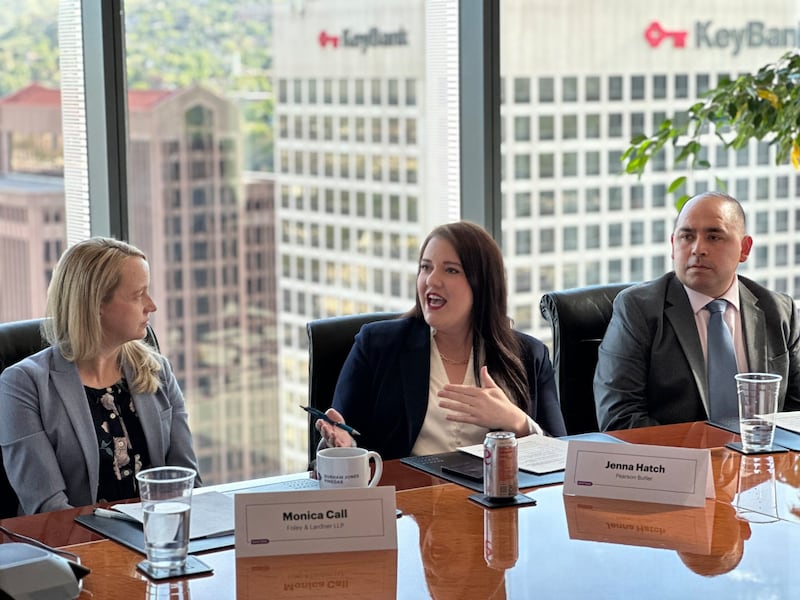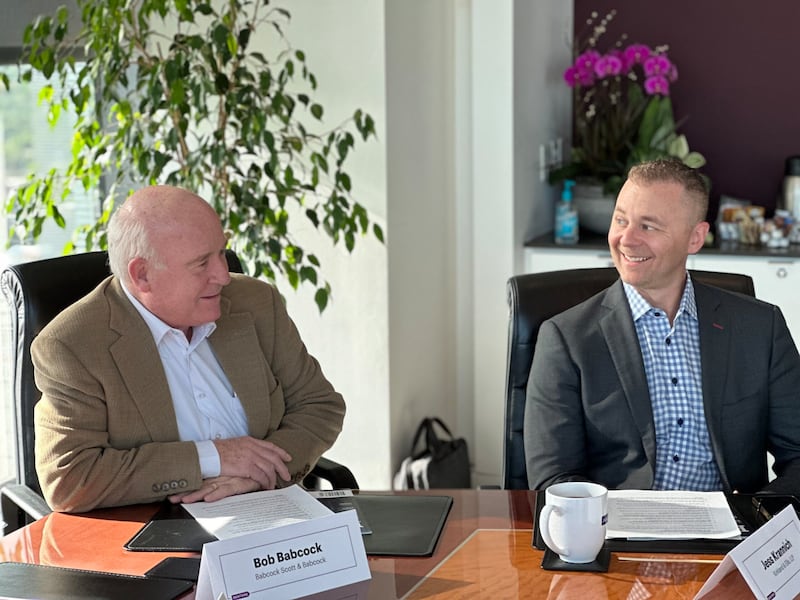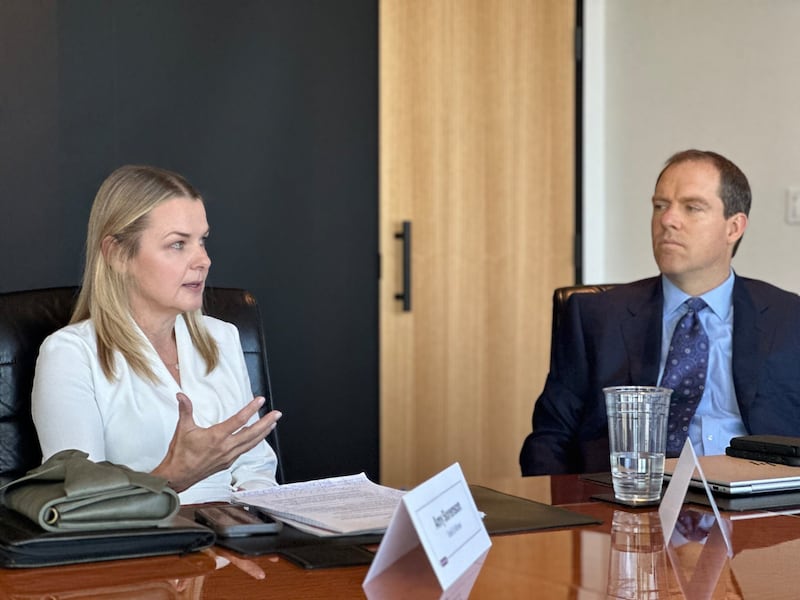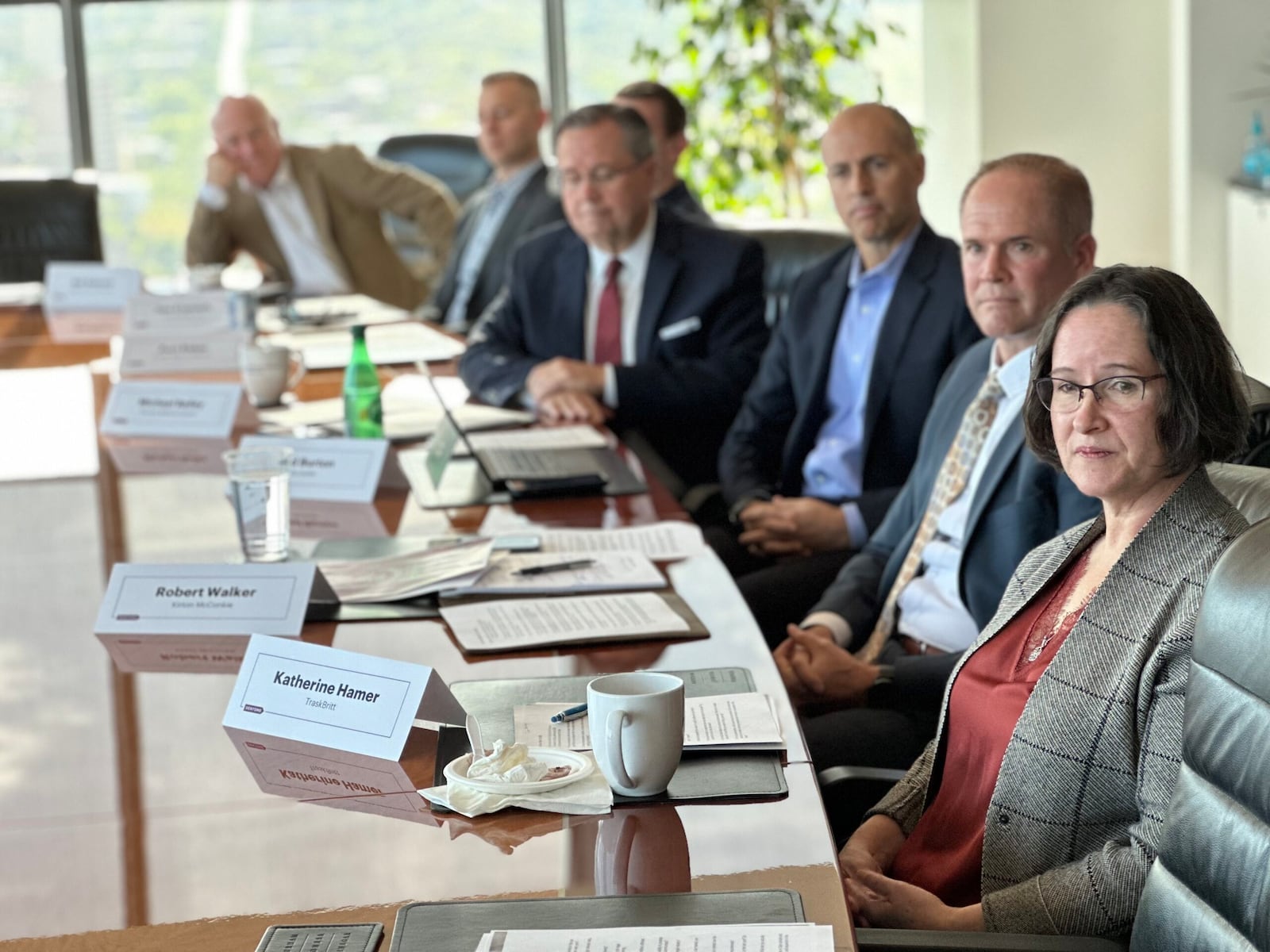This story appears in the June issue of Utah Business. Subscribe.
Last month, Utah Business partnered with Dentons Durham Jones Pinegar (Dentons) to host a roundtable on the legal industry in Utah. Moderated by N. Todd Leishman, a shareholder at Dentons, participants discussed changes in Utah’s legal market, lawyer-client relationships, the current expense of legal services and more.
What has changed in the Utah legal market in the last year?
Robert Walker | President & Shareholder | Kirton McConkie
We’re seeing a shift in how attorneys want to practice, particularly among the rising generation of associates. We’re finding that there’s a real desire to return to work and be accountable to not just projects but people. That desire to be in the office strengthens our culture and career development.
Russell Smith | Shareholder | Dentons
On the transactional side, we see clients using generative AI to do things themselves.
I love the entrepreneurial spirit, but it behooves us to educate our clients about our value. The AI we use on the transactional side is more for efficiency. It will impact how we train and utilize associates to generate things quicker for clients.
Brian Lebrecht | President, Director & Shareholder, Management Committee Member | Clyde Snow & Sessions
Tasks can be handled by automation, but decisions, judgment, experience and relationships cannot. The task is not to type the lease. The task is to find the right language and tone. What is the market? What can we negotiate? Where can we push? Where should we not? Those are the skills that clients are paying us for, and those are the skills that we should be giving them.
What is and isn’t working when implementing culture and mentorship with remote and in-office work?
Gavin Reese | Shareholder | Ray Quinney & Nebeker
We let people practice how they want. Most of our attorneys are now in the office. This, especially for the rising generation of associates, offers training opportunities and the opportunity to learn about how we like to do things at Ray Quinney.
Stanford Purser | Solicitor General | Utah Attorney General’s Office
Morale-wise, people like coming in three or four days a week. They like being treated like adults. It works exceptionally well for people who worked in the office before the pandemic; they have established relationships with others. But there is something about being in person, and many of our attorneys want to come in at least three days a week to associate with each other and bounce ideas off each other.
Russell Smith | Shareholder | Dentons
During the pandemic, we saw that many of our associates’ development was stunted. They just didn’t create those internal connections. The profession truly is, in my opinion, more of an apprenticeship. Culture and development are two big things that cannot be understated here. The more senior you are, the more flexibility makes sense, but we still do need those people to be mentors.
Ryan Atkinson | Shareholder | Strong & Hanni
We just hired two new attorneys and they both said they didn’t feel like they were getting the mentoring they needed [in their current positions]. When we interview associates working primarily remotely, we see that they want to be in an office because they recognize that they’re behind in terms of training and mentoring.
Jenna Hatch | Partner | Pearson Butler
During the pandemic, the younger generation of attorneys didn’t have much to compare themselves to to see what that development structure should or could look like. It has become easier for younger attorneys to see the disparate change that happens when they choose voluntarily to be back in the office more consistently.
Beau Burbidge | Partner | Burbidge | Mitchell
I had a deposition where I had to go to England because they were taking it in person. The client was shocked that I had to travel and spend their money to do that. They asked why I couldn’t do it via Zoom. I said, “If the opposing counsel is going to be there in person, then I need to be there.” But the expectation was that they would all be via Zoom, and I think that’s become more normalized.
Jed Burton | Shareholder | Buchalter
Before the pandemic hit, I had a client who became enamored with the concept of in-person, hammering out a negotiation by locking everybody in a conference room for a week or so and not letting anybody go home until it was done. There were some efficiencies, but sometimes you don’t get the right document because everybody is tired and wants to be done. Since the pandemic, we’ve completely gone away from that. We now do those kinds of things over teams and, maybe it doesn’t move quite as quickly, but our lifestyle has improved.

How are we training the next generation of lawyers to develop, track and maintain clients and relationships? Is remote work impacting these relationships?
Amy Sorenson | Partner | Snell & Wilmer
It is critical to be intentional. Remote possibilities free you up for in-person interaction that you and the client both choose. If you want to develop your relationship with your client, there’s almost no substitute for being in person.
Brian Lebrecht | President, Director & Shareholder, Management Committee Member | Clyde Snow & Sessions
If you’re working on a task, you can be anywhere. Working on a relationship is harder when you’re remote. You have to be very deliberate about your communication methods. There’s a lot to be said for just sitting and watching how to communicate with clients, handle opposing counsel or handle a bad day. I don’t think you can get that across in an email or a Zoom call.
Jonathan Wayas | Associate Director | Utah Center for Legal Inclusion (UCLI)
We’re a pipeline organization, so our clients are law students and future law students. We have been offering more in-person mentoring and networking opportunities and have found real value in that because a lot of these students, all they’ve known is remote [schooling]. They don’t have those [in-person networking] skills. They’re just not learning it in college right now. Four years’ worth of college and law students missed that.
Bob Babcock | President | Babcock Scott & Babcock
We have an open-door policy. That kind of interchange on a regular basis is critical for training and development. We also quickly put [new attorneys] in the fire. No one sits in the back room and writes memos. They are almost immediately thrust into client relationships and meetings. Quickly getting into the details and working with clients scares them, but it’s a great growing opportunity.
Robert Walker | President & Shareholder | Kirton McConkie
The rising generation of attorneys is a tech-savvy, brilliant group of individuals who can perform tasks at a wonderful level. If there’s an area to be improved, it’s often the relationship side. They have the skill set and abilities; they far exceed where we were at that time.
Beau Burbidge | Partner | Burbidge | Mitchell
If you haven’t participated in OCI [on-campus interviews] at the University of Utah or Brigham Young University, treat yourself. The lawyers coming up are incredibly impressive and from all over the country. It’s amazing that we can attract this kind of talent here.
Jess Krannich | Partner | Wilson Sonsini Goodrich & Rosati
We do ourselves a disservice if we don’t treat people as adults and give them the ability to do their jobs as professionals. I would rather take the approach that if somebody is taking advantage of the policy, is never in the office and is falling behind, then we can have that conversation. But aside from those circumstances, I’m much more likely to give people flexibility.
Is anyone having difficulty filling positions in their firms?
Katherine Hamer | President & Shareholder | TraskBritt
We are. For the work we do, we need people with certain technical degrees. Few people enter the University of Utah and Brigham Young University law schools with engineering, biology or chemistry degrees today. People with science degrees can find good-paying jobs outside of law. When I graduated, there was a huge discrepancy between what you could earn with your science degree and what you would earn with a law degree. Now, it’s pretty comparable.
J. Michael Bailey | Shareholder & Director, Strategic Growth | Parsons Behle & Latimer
We’re getting a lot of inquiries from associates in big law outside of the state who are looking to move to Salt Lake because they want to get out of those other states. The Salt Lake legal market is so hot right now. For Parsons, we’ll continue to have access to whatever lawyers we need because the economy and market are so good here.
Stanford Purser | Solicitor General | Utah Attorney General’s Office
As a government employer, we don’t pay as much as the private market. A person from the Idaho AG’s [Attorney General’s] office told us the salaries are about the same. They want to move to Utah, but after looking at housing costs and the cost of living, it wouldn’t make any sense. It’d be a net loss.
Monica Call | Partner | Foley & Lardner LLP
As a legal market, we face some of the same constraints other businesses here in Utah do. We’ve grown so fast, and there are so many opportunities that we have problems with affordable housing and child care. My clients have discussed expanding their presence here in Utah, [specifically] in Ogden, but child care choices are few and far between. Many are excited about the opportunity, but there isn’t the same infrastructure here.
Jess Krannich | Partner | Wilson Sonsini Goodrich & Rosati
As legal service providers, we’re in the most exciting market in the country for the next decade. Affordable housing is a key issue we must solve as our economy takes another step. Many cool things are happening here, creating many opportunities but also some challenges. Public housing is one [issue] that we absolutely have to find better ways to solve.

What do you see in terms of the willingness of firms to support pro bono efforts?
Monica Call | Partner | Foley & Lardner LLP
Throughout my career, I’ve been at places that have been really supportive of pro bono work. For young lawyers, it offers the opportunity to gain in-court experience and helps them be more engaged in the community. As we’ve emphasized it, our participation rates have risen. Firms need to put their money where their mouth is and give billable hour credit to it.
Amy Sorenson | Partner | Snell & Wilmer
Our state court judicial system is excellent. The vast majority of cases are debt collection, largely with unrepresented defendants. They have been amazing at addressing this issue with pro-state clinics and could use hundreds of hours a week of people answering phone calls with law degrees. There’s no end to the support we can give them. We think about pro bono as individual cases, but they’re thinking about an ecosystem and how to handle tens of thousands of matters. Our pro bono work is incredible, and all of our law firms do a great job, but I don’t want to miss the opportunity to acknowledge what the state court system is already doing with so little.
As inflation causes prices to rise, are you starting to see clients push back because services are too expensive?
J. Michael Bailey | Shareholder & Director, Strategic Growth | Parsons Behle & Latimer
We allow our lawyers to set their own rates because nobody knows their clients better than the lawyers themselves, which has helped us. It makes our lawyers feel like they’re being treated like adults and allows them to adjust their rates as they need to help clients.
Kurt Reber | Partner | Kunzler Bean & Adamson
Our firm situation may be unique, but I have not seen an increase in that conversation. Once a client experiences hardship, they realize the value you provide is worth it. Even though our rates have tried to keep in line with inflation and increasing costs for the firm and individuals, we haven’t seen much pushback so far.
Gavin Reese | Shareholder | Ray Quinney & Nebeker
I haven’t seen an increase or decrease, but in our firm, we’ve seen an increase in clients who have historically used national firms. They say they can’t justify the expense of day-to-day things and want to go local to find alternatives.
Katherine Hamer | President & Shareholder | TraskBritt
We definitely have. Our clients have dictated flat fees for much of our bread-and-butter work. Over the last six months, we’ve approached some longstanding clients about raising those flat fees, and they tell us no. We have some rates that have been held since 2015. We haven’t had increases, but our salaries, rents, etc., have gone way up.
How is our industry doing with inclusiveness?
Jonathan Wayas | Associate Director | UCLI
There are some particularly strong headwinds against diversity and inclusion. We’re seeing that in the legal profession all the way from the very top nationally to here locally. Many of the students we work with are first-generation law students from certain ethnic backgrounds. They tend to pigeonhole themselves in certain industries, so I’m grateful for the firms that have created scholarship positions and summer associate programs to show them they can succeed in bigger firms. They can get into these firms and start to build generational wealth but also, through pro bono work, give back in the way they envisioned when dreaming of being a lawyer.
Jenna Hatch | Partner | Pearson Butler
My organization did the UCLI Certification training, and it started a conversation that I never knew needed to happen. It began three years of unfolding what additional obstacles we can remove that prevent people from moving through their legal careers effectively or with meaningful opportunities.



